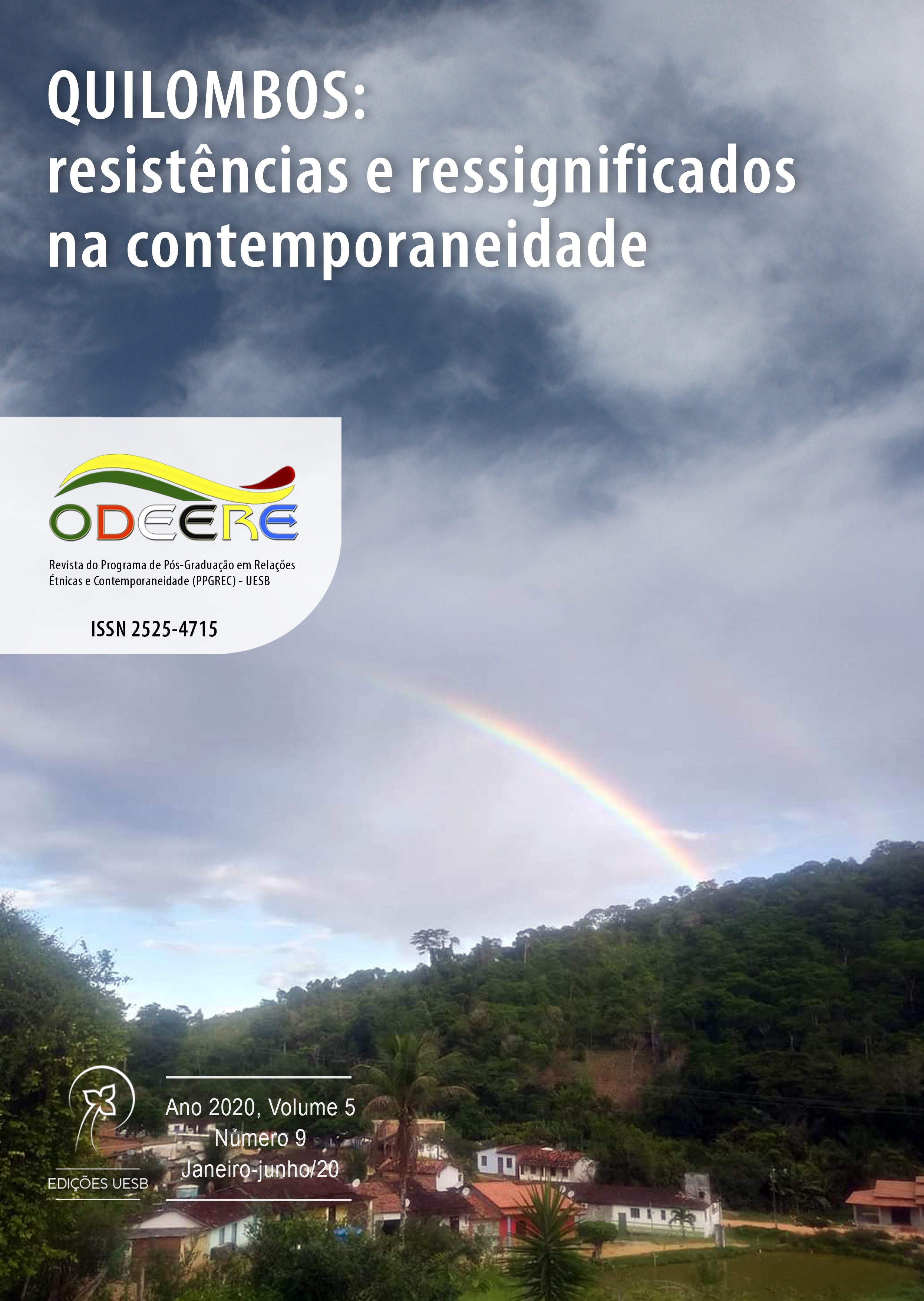The capoeira game, as a motivational tool, for the development of reading, in a state school, in the city of Itabuna - Bahia - Brazil
DOI:
https://doi.org/10.22481/odeere.v5i9.6533Keywords:
Capoeira, Fomento à Leitura, Gêneros Textuais, Lúdico.Abstract
Capoeira or capoeiragem is a Brazilian cultural expression that mixes game, martial art, sport, popular culture, tradition, dance and music. Developed in Brazil by descendants of African slaves, capoeira is characterized by strokes and agile and complex movements, using primarily kicks and sweeps, as well as head butts, knees, elbows, aerial or ground aerobatics. Capoeira practitioners learn not only fighting and playing, but also playing the typical instruments and singing. Thus, 6th grade students of a state school in Itabuna City— BA, what had difficulty reading and writing, they drew the attention of the capoeira master and the teachers. However, in capoeira classes, students were more motivated to read..Then, the problem that guided this research emerged, namely: how the capoeira game has been worked to stimulate the improvement of learning in reading with 6th grade students at a state school in Itabuna City - BA? Therefore, the general objective of this article is to analyze how the master uses the game of capoeira as a motivational tool, in pedagogical practices, for the improvement of reading learning, among 6th grade students, at elementary education II. Thus, the use of reading strategies, starting from the diversity of textual genres, in a playful way, by using the capoeira game in the teaching-learning process, is a subject that is discussed in this research, because it is justified by the need to contribute to a improvement of the teaching and learning process, based on assumptions present at the BNCC.
Keyword: Capoeira, Promotion of Reading, Textual Genres, Playful
Downloads
References
BARBOSA, D. Gêneros textuais como ferramenta para o ensino de Língua Portuguesa. Fundação Carmelitana Mário Palmério / Faculdade de Ciências Humanas e Sociais. Fucamp/ Facihus, 2015.
BICKEL, E.A; MARQUES, M.G.; SANTOS, G.A. Esporte e sociedade: a construção de valores na prática esportiva em projetos sociais. EFDeportes, Revista Digital – Buenos Aires, Ano 17, nº 171, 2012.
BRASIL, Base Nacional Comum Curricular). Educação Física, 2018. Disponível em:< http://basenacionalcomum.mec.gov.br>. Acesso em 02 de agosto de 2019.
BRASIL. Parâmetros Curriculares Nacionais – Volume Introdutório, Brasília, MEC, 1998.
CAMPOS, H. (Mestre Xaréu) Capoeira na Escola. Salvador-Bahia, EdUfba-Coleção pré-textos, 2011.
CAMPOY, A. T. J. Metodología de la Investigación Científica. Manual para elaboración de Tesis y trabajos de Investigación. Asunción, Paraguay: Marben, 2016.
D´Andrade, C.V.Á. Capoeira: de luta de negro a exercício de branco. Itabuna Bahia, Editora Litterarum, 2011.
Freire, P. Pedagogia da autonomia: saberes necessários a prática educativa. 35 ed. São Paulo: Paz e Terra, 1996.
Gil, A. C. Métodos e Técnicas de Pesquisa Social. 6ª edição. São Paulo, Atlas, 2008.
LEÃO, L. M. Metodologia do estudo e Pesquisa. Petrópolis RJ, Vozes, 2016.
LOPES, F. C. A.; Santana. S. R. Entre a teoria e a prática: os discursos da Educação Física. Pedagogia em Foco, volume 10, n. 3, 2016.
MARCONI, M. de A.; LAKATOS, E. M. Fundamentos da metodologia científica. 7. ed. São Paulo, Atlas, 2010.
MARCUSCHI, L. A. Produção textual, análise de gêneros e compreensão. São Paulo, Parábola, 2008.
Downloads
Published
How to Cite
Issue
Section
License
Copyright (c) 2020 ODEERE

This work is licensed under a Creative Commons Attribution 4.0 International License.
You are free to:
Share - copy and redistribute the material in any medium or format; Adapt - remix, transform, and build from the material for any purpose, even commercially. This license is acceptable for Free Cultural Works. The licensor cannot revoke these freedoms as long as you follow the terms of the license.
Under the following terms:
Attribution - You must appropriately give credit, provide a link to the license, and indicate if any changes have been made. You may do so in any reasonable way, but not in a way that suggests that you or your use is endorsed by the licensor.
There are no additional restrictions - You cannot apply legal terms or technological measures that legally restrict others to make any use permitted by the license.














